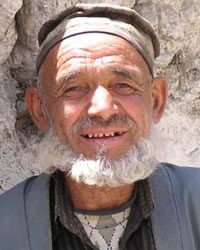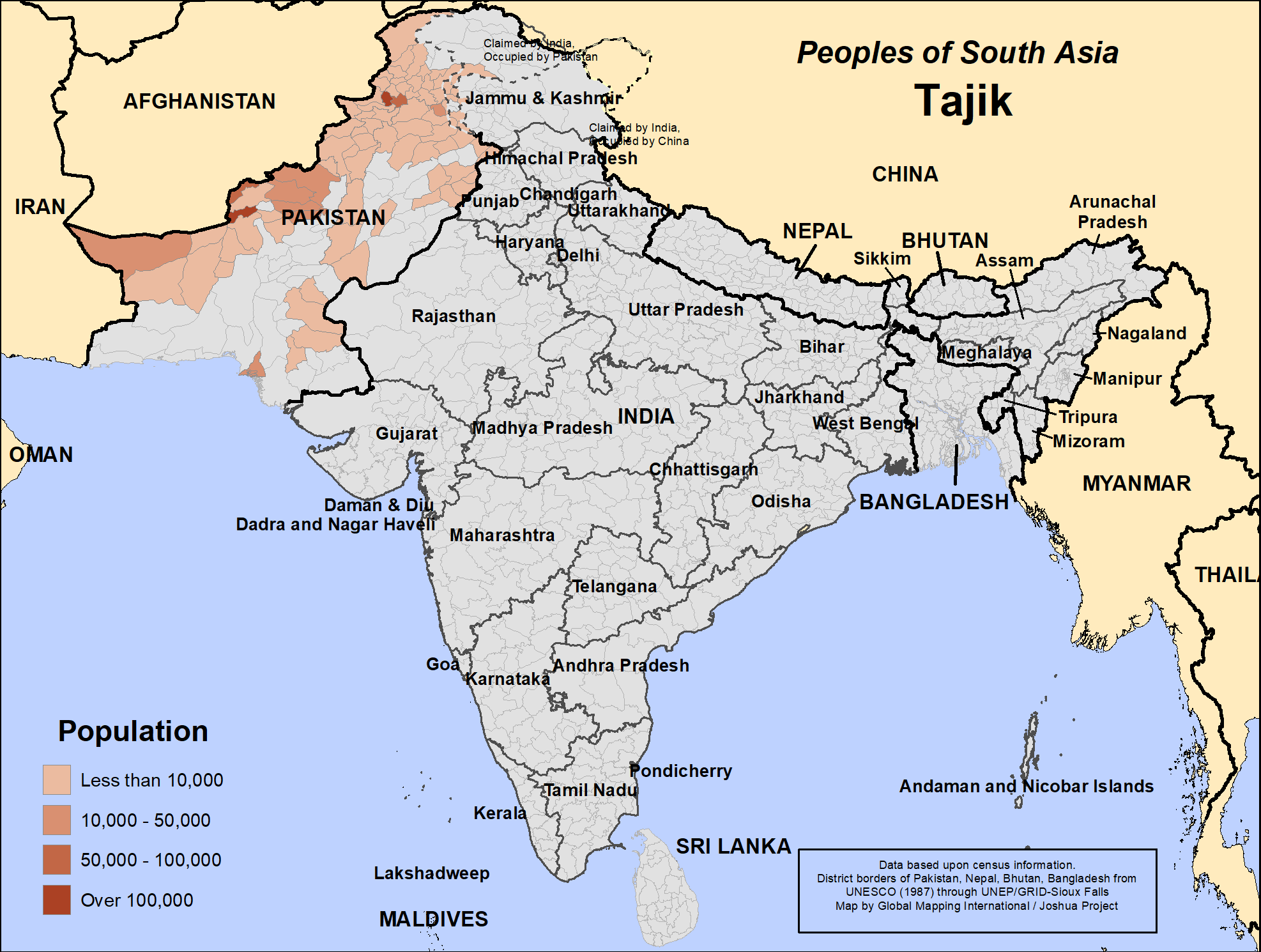Tajik in Pakistan

Photo Source:
Anonymous
|

Map Source:
People Group data: Omid. Map geography: UNESCO / GMI. Map Design: Joshua Project.
|
| People Name: | Tajik |
| Country: | Pakistan |
| 10/40 Window: | Yes |
| Population: | 981,000 |
| World Population: | 12,386,800 |
| Primary Language: | Dari |
| Primary Religion: | Islam |
| Christian Adherents: | 0.00 % |
| Evangelicals: | 0.00 % |
| Scripture: | Complete Bible |
| Ministry Resources: | Yes |
| Jesus Film: | Yes |
| Audio Recordings: | Yes |
| People Cluster: | Tajik |
| Affinity Bloc: | Persian-Median |
| Progress Level: |
|
Introduction / History
. Tajiks have repeatedly been invaded and conquered throughout their history. The armies of Alexander the Great, the Arabs in the seventh century, Genghis Khan, the Turks, the British, and the Russian Empire have all had a profound impact on these people. Their two main occupations are animal husbandry and farming.
The primary language of the Pakistani Tajiks is Dari. A complete Bible became available in Dari in 2008. The JESUS Film has also been translated into Dari. Some of the Tajik men are able to speak Urdu, the national language of Pakistan. A tiny fraction of Pakistani Tajiks are believers.
The majority of the Tajik people live in the Tajkistan, the former Soviet Central Asian republic. The numerous invasions have been the major factor in the dispersion of Tajiks to other locations. A sizable population of Tajiks live in northern Pakistan.
What Are Their Lives Like?
Other than their shared Sunni Muslim religion, the Tajiks share little in common with the Pakistani majority. Their language is far different, and even their history is tainted by Russian colonialism rather than British colonialism of Pakistan.
Women wear colorful national costumes with printed cottons and silks, accented by flowered head scarves. They rarely wear veils; however, they do wear chadors, which are multi-purpose shawls. The men wear shirts and trousers, sometimes with quilted robes and belts. They also wear embroidered skull caps, and some wear turbans or fur hats during the cold winter months.
The upper-class Tajiks and city dwellers tend to wear European style clothing. More and more Tajiks are moving to Pakistani cities to take advantage of better economic and educational opportunities. Since schools are conducted in Urdu, there is a danger that Tajik children may lose their Tajik heritage.
They serve green tea with most meals. Bread is the staple food, and the Tajiks bake bread out of anything that can be ground into flour, including wheat, barley, and peas. They also eat starchy foods, rice, grapes, dried fruits, chicken, lamb, and vegetable dishes. Muslims Tajiks do not eat pork.
A Tajik man may have up to four wives if he can afford them. Urban Tajiks often marry outside their group as long as the spouse is Muslim.
Tajik society is patriarchal, meaning that the authority belongs to the oldest males of the extended family. Villages and communities are ruled by a majlis, or council, made up of the male leaders of prominent families. All inheritances are passed down through the males. After marriage, a young bride lives with her new husband's family. Traditionally, marriages were arranged. Today, however, most Tajik choose their own mates.
Poetry plays an important part in Tajik culture. It is read at important celebrations and often sung. Even the Koran has been put to music.
What Are Their Beliefs?
The Tajik people are Sunni Muslims. They believe that the supreme God, Allah, spoke through his prophet, Mohammed, and taught mankind how to live a righteous life through the Koran and the Hadith. To live a righteous life, you must utter the Shahada (a statement of faith), pray five times a day facing Mecca, fast from sunup to sundown during the month of Ramadan, give alms to the poor, and make a pilgrimage to Mecca if you have the means. Muslims are prohibited from drinking alcohol, eating pork, gambling, stealing, slandering, and making idols. They gather for corporate prayer on Friday afternoons at a mosque, their place of worship.
The two main holidays for Sunni Muslims are Eid al Fitr, the breaking of the monthly fast and Eid al Adha, the celebration of Abraham's willingness to sacrifice his son to Allah.
Sunni religious practices are staid and simple. They believe that Allah has pre-determined our fates; they minimize free will.
In most of the Muslim world, people depend on the spirit world for their daily needs since they regard Allah as too distant. Allah may determine their eternal salvation, but the spirits determine how well we live in our daily lives. For that reason, they must appease the spirits. They often use charms and amulets to help them with spiritual forces.
What Are Their Needs?
Sunni Islam claims to offer the way to live based on the teachings spelled out in the Koran, the Muslim holy book. Very few people in the Tajik communities of Pakistan will challenge this traditional belief. There are Punjabi-speaking believers in Pakistan and a few Tajik speaking ones who live hundreds of miles away. They can be Christ's ambassadors to these Sunni Muslims. Rural Tajiks would benefit by modern medicine.
If there are any followers of Christ among the Tajiks in Pakistan, they need the power of the Holy Spirit to stand up against spiritual opposition. It will take much dedication to the only savior for them to stand up for Christ.
Prayer Points
Pray for Tajiks in Pakistan to receive justice and mercy in lands where minorities are often mistreated.
Pray for a movement to Christ among the Tajiks of Pakistan that will spread throughout Central Asia.
Pray for Tajik-language biblical materials and radio programs to become easy to access, and for Tajik leaders to embrace the teachings of Jesus Christ.
Pray for the Holy Spirit to touch the hearts and lives of Tajik leaders in Pakistan so they can open the "cultural gates" to the ways of the only Savior.